Submitted:
18 October 2023
Posted:
19 October 2023
You are already at the latest version
Abstract

Keywords:
1. Introduction
2. Materials and Methods
2.1. Area of Study and Seismicity of the Period
2.2. Multifractal Detrended Fluctuation Analysis (MFDFA)
2.1.1. Application of MFDFA
- The mean value of a time series of length () is calculated as:
- If the time series’ incremental changes around the average value follow of a random walk, the integrated profile is obtained aswhere . Note that by integrating the time series the measurement noise is reduced.
- The time series is split into discrete non-overlapping bins, where is the integer part of and is the time span. Since is not by definition an integer, and therefore is not always an integer multiple of , a small part of the time series is not taken into account, hence it is not processed. To overcome this, the same process is implemented however inversely starting from the end of the series to its beginning. In this way the non-processed segments are compensated and a better estimation is achieved.
- In every bin, the series’s data is fitted to a polynomial and the variance is calculated in the forward () and backward () directions in order to find the local trend of each of the two bins. Then, the square of the fluctuations is calculated aswhere is the local polynomial fit of the integrated profile at value . Likewise in every bin’s to the backward direction, the square of the fluctuations is:
-
After detrending the series, the order fluctuation function is calculated as the average of all the squares of the fluctuations in both the forward and backward directions aswhere the exponent is a variable when and is real. Fluctuation in Equation (5) is defined only for spans .When Equation (5) yields to the logarithmic averaging according to Equation (6):When Equation (5) coincides with the typical monofractal DFA procedure.
- From the above equations, the generalised fluctuation functions are calculated for various values and time spans . If the time series has long-range power-law correlations, exhibits, for long values of scales , a power law with according to Equation (7):where the exponent is known as Generalised Hurst Exponent. In order to calculate , the vs is plotted in a log-log scale for as a function of . When , the classical Hurst Exponent, , is derived from (7) and the corresponding log-log plot is the usual DFA diagram [47,48]. If is independent of , the time series is monofractal. If is a function of the series is multifractal, because tiny and large variations scales act differently. The stronger the dependence of with the stronger the multi fractal features that the series exhibit. Note that, for negative , describes the scaling behaviour of segments with small fluctuations (small deviations from the corresponding fit) whereas for positive >, describes the scaling behaviour of segments with large fluctuations (large deviations from the corresponding fit).
- The generalised Hurst Exponent is associated with classical scaling exponent according to Equation (8):
- 8.
- The multifractal behaviour of time series can be delineated through the multifractal spectrum ersus , where is the Legendre transform of , . Note that , known the Holder exponent, estimates the singularity strength, while , specifies the fractal dimension of the subset series, that is characterised by . The association of , and are summarised in Equations (9) and (10):
- 9.
- Each singularity spectrum is fitted to a quadratic function at the point of its maximum at . This quantifies the intensity of the multifractal behaviour of the singularity spectrum because it measures the range of the multifractal exponents that are present in each plot.It is for this reason that is referred many times as the degree of fractality. Extrapolating the fitted quadratic curve to zero, the spectrum’s width is calculated. The richer the multifractality in the dataset, the wider the width is [49,50]. By definition is given by Equation (11) [51]:
2.3. Frequency Magnitude Distribution
3. Results and Discussion
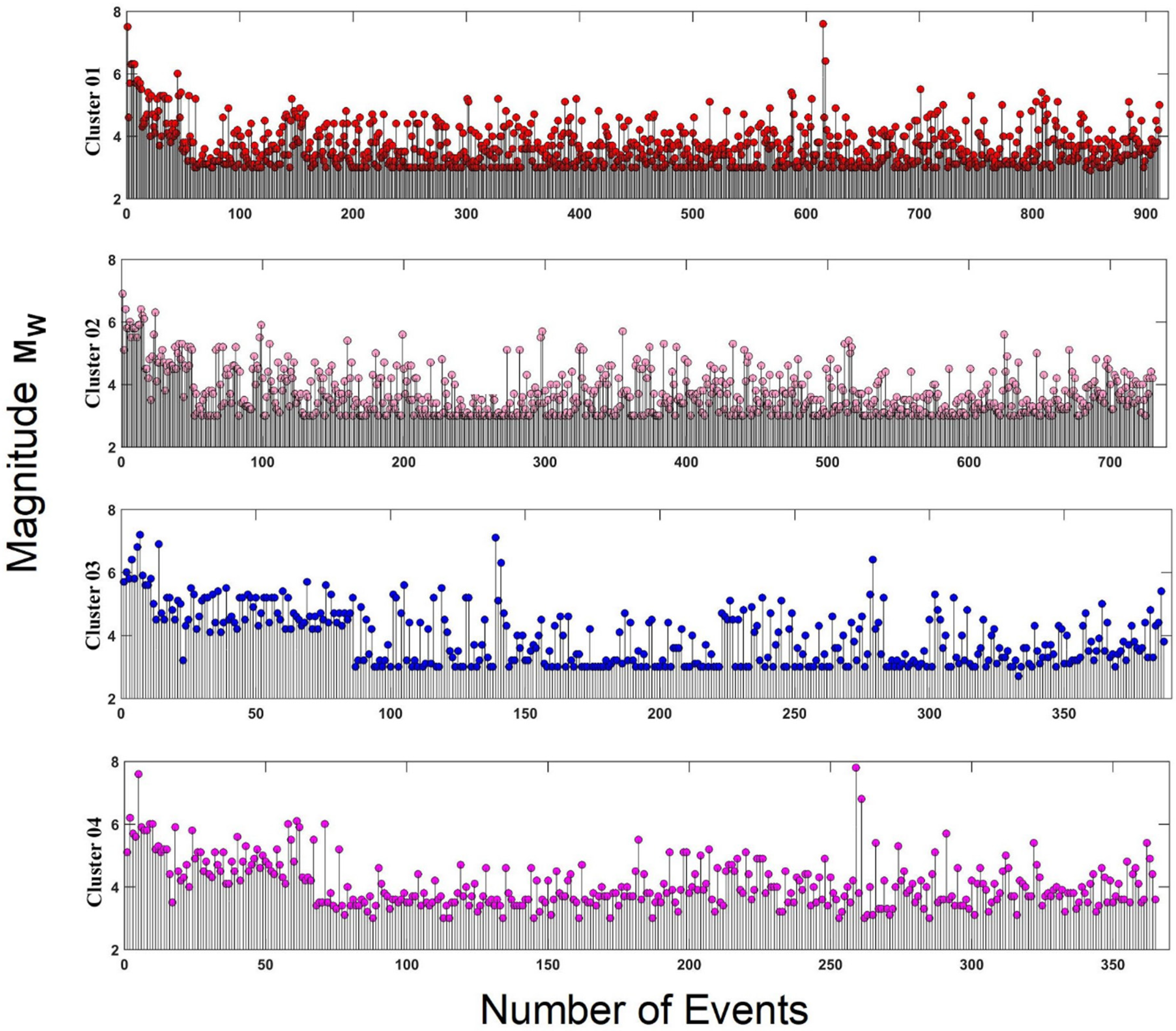
4. Conclusions
Author Contributions
Funding
Data Availability Statement
Conflicts of Interest
References
- Cicerone, R.D.; Ebel, J.E.; Britton, J. A Systematic Compilation of Earthquake Precursors. Tectonophysics 2009, 476, 371–396. [Google Scholar] [CrossRef]
- Hough, S. The Great Quake Debate. The Crusader, the Skeptic and the Rise of Modern Seismology. Environ. Hist. 2021, 27, 699–700. [Google Scholar] [CrossRef]
- Hayakawa, M.; Hobara, Y. Current Status of Seismo-Electromagnetics for Short-Term Earthquake Prediction. Geomatics, Nat. Hazards Risk 2010. [Google Scholar] [CrossRef]
- Molchanov, O.A.; Hayakawa, M. Seismo-Electromagnetics and Related Phenomena: History and Latest Results. Terrapub 2008. [Google Scholar]
- Pre-Earthquake Processes: A Multidisciplinary Approach to Earthquake Prediction Studies. Ouzounov, D.; Pulinets, S.; Hattori, K.; Taylor, P. (Eds.) Wiley, 2018. [Google Scholar]
- Petraki, E.; Nikolopoulos, D.; Nomicos, C.; Stonham, J.; Cantzos, D.; et al. Electromagnetic Pre-Earthquake Precursors: Mechanisms, Data and Models-A Review. J. Earth Sci. Clim. Chang. 2015, 6, 250. [Google Scholar] [CrossRef]
- Petraki, E.; Nikolopoulos, D.; Panagiotaras, D.; Cantzos, D.; Yannakopoulos, P.; et al. Radon-222: A Potential Short-Term Earthquake Precursor. J. Earth Sci. Clim. Chang. 2015, 6, 282. [Google Scholar] [CrossRef]
- Uyeda, S.; Nagao, T.; Kamogawa, M. Short-Term Earthquake Prediction: Current Status of Seismo-Electromagnetics. Tectonophysics 2009, 470, 205_213. [Google Scholar] [CrossRef]
- Conti, L.; Picozza, P.; Sotgiu, A. A Critical Review of Ground Based Observations of Earthquake Precursors. Front. Earth Sci. 2021, 9. [Google Scholar] [CrossRef]
- Turcotte, D.L. Fractals and Chaos in Geology and Geophysics; Cambridge University Press: Cambridge, UK, 1997; ISBN 9781139174695. [Google Scholar] [CrossRef]
- Turcotte, D.L; Schubert, G. Geodynamics; Cambridge University Press: Cambridge, UK, 2002; pp. 1–456. ISBN 0-521-66624-4. [Google Scholar]
- Ito, K. Towards a New View of Earthquake Phenomena. In Fractals and Chaos in the Earth Sciences; Birkhäuser: Birkhäuser, 1992; pp. 531–548. [Google Scholar]
- Yamagishi, Y.; Saito, K.; Hirahara, K.; Ueda, N. Spatio-Temporal Clustering of Earthquakes Based on Distribution of Magnitudes. Appl. Netw. Sci. 2021, 6. [Google Scholar] [CrossRef]
- Telesca, L.; Pastén, D.; Muñoz, V. Analysis of Time Dynamical Features in Intraplate Versus Interplate Seismicity: The Case Study of Iquique Area (Chile). Pure Appl. Geophys. 2020, 177, 4755–4773. [Google Scholar] [CrossRef]
- Varotsos, P.A.; Sarlis, N.V.; Skordas, E.S. Study of the Temporal Correlations in the Magnitude Time Series before Major Earthquakes in Japan. J. Geophys. Res. Space Physics 2014, 119, 9192–9206. [Google Scholar] [CrossRef]
- Corral, Á. Long-Term Clustering, Scaling, and Universality in the Temporal Occurrence of Earthquakes. Phys. Rev. Lett. 2004, 92. [Google Scholar] [CrossRef]
- Ambikapathy, A.; Gahalaut, V. Time Clustering of Earthquakes in the Sumatra–Andaman and Himalayan Regions. Curr. Sci. 2011, 1068–1071. [Google Scholar]
- Seydoux, L.; Balestriero, R.; Poli, P.; Hoop, M. de; Campillo, M.; Baraniuk, R. Clustering Earthquake Signals and Background Noises in Continuous Seismic Data with Unsupervised Deep Learning. Nat. Commun. 2020, 11. [Google Scholar] [CrossRef]
- Lennartz, S.; Livina, V.N.; Bunde, A.; Havlin, S. Long-Term Memory in Earthquakes and the Distribution of Interoccurrence Times. EPL 2008, 81, 69001. [Google Scholar] [CrossRef]
- Kagan, Y.Y. Earthquake Spatial Distribution: The Correlation Dimension. Geophys. J. Int. 2007, 168, 1175–1194. [Google Scholar] [CrossRef]
- Bak, P.; Christensen, K.; Danon, L.; Scanlon, T. Unified Scaling Law for Earthquakes. Phys. Rev. Lett. 2002, 88. [Google Scholar] [CrossRef] [PubMed]
- Barazangi, M.; Isacks, B.L. Spatial Distribution of Earthquakes and Subduction of the Nazca Plate beneath South America. Geology 1976, 4, 686. [Google Scholar] [CrossRef]
- Davidsen, J.; Paczuski, M. Analysis of the Spatial Distribution Between Successive Earthquakes. Phys. Rev. Lett. 2005, 94. [Google Scholar] [CrossRef]
- Marekova, E. Analysis of the Spatial Distribution between Successive Earthquakes Occurred in Various Regions in the World. Acta Geophys. 2014, 62, 1262–1282. [Google Scholar] [CrossRef]
- Ramírez-Rojas, A.; Flores-Márquez, E.L. Nonlinear Statistical Features of the Seismicity in the Subduction Zone of Tehuantepec Isthmus, Southern México. Entropy 2022, 24, 480. [Google Scholar] [CrossRef]
- Vasylkivska, V.S.; Huerta, N.J. Spatiotemporal Distribution of Oklahoma Earthquakes: Exploring Relationships Using a Nearest-Neighbor Approach. J. Geophys. Res. Solid Earth 2017, 122, 5395–5416. [Google Scholar] [CrossRef]
- Son, M.; Cho, C.S.; Shin, J.S.; Rhee, H.-M.; Sheen, D.-H. Spatiotemporal Distribution of Events during the First Three Months of the 2016 Gyeongju, Korea, Earthquake Sequence. BSSA 2017, 108, 210–217. [Google Scholar] [CrossRef]
- Christensen, K.; Danon, L.; Scanlon, T.; Bak, P. Unified Scaling Law for Earthquakes. Proc. Natl. Acad. Sci. USA 2002, 99, 2509–2513. [Google Scholar] [CrossRef] [PubMed]
- Aggarwal, S.K.; Pastén, D.; Khan, P.K. Multifractal Analysis of 2001 Mw7.7 Bhuj Earthquake Sequence in Gujarat, Western India. Phys. A: Stat. 2017, 488, 177–186. [Google Scholar] [CrossRef]
- Kayal, J.R.; Das, V.; Ghosh, U. An Appraisal of the 2001 Bhuj Earthquake (Mw 7.7, India) Source Zone: Fractal Dimension and b Value Mapping of the Aftershock Sequence. Pure Appl. Geophys. 2012, 169, 2127–2138. [Google Scholar] [CrossRef]
- Peng, C.K.; Hausdorff, J.M; Havlin, S.; Mietus, J.E.; Stanley, H.E.; Goldberger, A.L. Multiple-Time Scales Analysis of Physiological Time Series under Neural Control. Phys. A Stat. 1998, 249, 491–500. [Google Scholar] [CrossRef] [PubMed]
- Varotsos, P.A.; Sarlis, N.V.; Skordas, E.S. Scale-Specific Order Parameter Fluctuations of Seismicity before Mainshocks: Natural Time and Detrended Fluctuation Analysis. EPL 2012, 99, 59001. [Google Scholar] [CrossRef]
- Varotsos, P.A.; Sarlis, N.V.; Skordas, E.S. Study of the Temporal Correlations in the Magnitude Time Series before Major Earthquakes in Japan. J. Geophys. Res. Space Phys. 2014, 119, 9192–9206. [Google Scholar] [CrossRef]
- Kantelhardt, J.W.; Zschiegner, S.A.; Koscielny-Bunde, E.; Havlin, S.; Bunde, A.; Stanley, H.E. Multifractal Detrended Fluctuation Analysis of Nonstationary Time Series. Phys. A Stat. 2002, 316, 87–114. [Google Scholar] [CrossRef]
- Flores-Márquez, E.L.; Ramírez-Rojas, A.; Telesca, L. Multifractal Detrended Fluctuation Analysis of Earthquake Magnitude Series of Mexican South Pacific Region. Appl. Math. Comput. 2015, 265, 1106–114. [Google Scholar] [CrossRef]
- Gutenberg, B.; Richter, C.F. Frequency of Earthquakes in California. BSSA 1944, 34, 185–188. [Google Scholar] [CrossRef]
- Kazmi, A.H.; Jan, M.Q. Geology and Tectonics of Pakistan. Graphic Publications: Karachi, Pakistan, 1997; pp. 1–650. ISBN 969-8375-007. [Google Scholar]
- Scordilis, E.M. Empirical Global Relations Converting MS and mb to Moment Magnitude. J. Seismol. 2006, 10, 225–236. [Google Scholar] [CrossRef]
- Idriss, I.M. Evaluating seismic risk in engineering practice. In Proceedings of the eleventh international conference on soil mechanics and foundation engineering, San Francisco, USA 12–16 August 1985. [Google Scholar]
- Ambraseys, N.N. Uniform Magnitude Re-Evaluation of European Earthquakes Associated with Strong-Motion Records. Earthq. Eng. Struct. Dyn. 1990, 19, 1–20. [Google Scholar] [CrossRef]
- Ambraseys, N. Earthquakes and Associated Deformation in Northern Baluchistan 1892-2001. BSSA 2003, 93, 1573–1605. [Google Scholar] [CrossRef]
- Ristau, J. Comparison of Magnitude Estimates for New Zealand Earthquakes: Moment Magnitude, Local Magnitude, and Teleseismic Body-Wave Magnitude. BSSA 2009, 99, 1841–1852. [Google Scholar] [CrossRef]
- Hutton, L.K.; Boore, D.M. The ML Scale in Southern California. BSSA 1987, 77, 2074–2094. [Google Scholar] [CrossRef]
- Mushtaq, M.N.; Tahir, M.; Shah, M.A.; Khanam, F. Development of Local Magnitude Scale for the Northern Punjab, Pakistan. J. Seismol. 2019, 23, 403–416. [Google Scholar] [CrossRef]
- Mushtaq, M.N.; Tahir, M.; Iqbal, M.T.; Shah, M.A.; Iqbal, S.; Iqbal, T. Calibration of Local Magnitude Scale for Hindukush Continental Subduction Zone. Earthq. Sci. 2021, 34, 114–122. [Google Scholar] [CrossRef]
- Tahir, M.; Khan, A.; Mushtaq, M.N.; Iqbal, M.T.; Iqbal, T.; Shah, M.A.; Khan, K.; Soomro, R.A. Distance Attenuation and Local Magnitude Scale Based on Constant Geometrical Spreading in Northern Punjab, Pakistan. Acta Geophys. 2021, 69, 1567–1584. [Google Scholar] [CrossRef]
- Chen, Z.; Ivanov, P.C.; Hu, K.; Stanley, H.E. Effect of Nonstationarities on Detrended Fluctuation Analysis. Phys. Rev. E 2002, 65, 041107. [Google Scholar] [CrossRef]
- Kantelhardt, J.W.; Koscielny-Bunde, E.; Rego, H.H.A.; Havlin, S.; Bunde, A. Detecting Long-Range Correlations with Detrended Fluctuation Analysis. Phys. A: Stat. 2001, 295, 441–454. [Google Scholar] [CrossRef]
- Telesca, L.; Lapenna, V.; Macchiato, M. Mono- and Multi-Fractal Investigation of Scaling Properties in Temporal Patterns of Seismic Sequences. Chaos Solit. Fractals 2004, 19, 1–15. [Google Scholar] [CrossRef]
- Telesca, L.; Lapenna, V.; Macchiato, M. Multifractal Fluctuations in Seismic Interspike Series. Phys. A: Stat. 2005, 354, 629–640. [Google Scholar] [CrossRef]
- Telesca, L.; Lasaponara, R. Vegetational Patterns in Burned and Unburned Areas Investigated by Using the Detrended Fluctuation Analysis. Phys. A: Stat. 2006, 368, 531–535. [Google Scholar] [CrossRef]
- Ghosh, D.; Deb, A.; Dutta, S.; Sengupta, R.; Samanta, S. Multifractality of Radon concentration fluctuation in earthquake relatied signal. Fractals 2012, 20, 33–39. [Google Scholar] [CrossRef]
- Zúñiga, F.R.; Wiemer, S. Seismicity Patterns: Are They Always Related to Natural Causes? Pure Appl. Geophys. 1999, 155, 713–726. [Google Scholar] [CrossRef]
- Schorlemmer, D.; Wiemer, S. Microseismicity Data Forecast Rupture Area. Nature 2005, 434, 1086–1086. [Google Scholar] [CrossRef]
- Farrell, J.; Husen, S.; Smith, R.B. Earthquake Swarm and b-Value Characterization of the Yellowstone Volcano-Tectonic System. J. Volcanol. Geotherm. Res. 2009, 188, 260–276. [Google Scholar] [CrossRef]
- Gulia, L.; Wiemer, S. The Influence of Tectonic Regimes on the Earthquake Size Distribution: A Case Study for Italy. Geophys. Res. Let. 2010, 37, L10305. [Google Scholar] [CrossRef]
- Gulia, L.; Wiemer, S. Real-Time Discrimination of Earthquake Foreshocks and Aftershocks. Nature 2019, 574, 193–199. [Google Scholar] [CrossRef]
- Scholz, C.H. On the Stress Dependence of the Earthquake b-Value. Geophys. Res. Let. 2015, 42, 1399–1402. [Google Scholar] [CrossRef]
- Kulhanek, O.; Persson, L.; Nuannin, P. Variations of b-Values Preceding Large Earthquakes in the Shallow Subduction Zones of Cocos and Nazca Plates. J. South Am. Earth Sci. 2018, 82, 207–214. [Google Scholar] [CrossRef]
- Kalyoncuoglu, U.Y. Evaluation of Seismicity and Seismic Hazard Parameters in Turkey and Surrounding Area Using a New Approach to the Gutenberg–Richter Relation. J. Seismol. 2006, 11, 131–148. [Google Scholar] [CrossRef]
- El-Isa, Z.H.; Eaton, D.W. Spatiotemporal Variations in the b-Value of Earthquake Magnitude–Frequency Distributions: Classification and Causes. Tectonophysics 2014, 615–616, 1–11. [Google Scholar] [CrossRef]
- Utsu, T. A Statistical Significance Test of the Difference in b-Value between Two Earthquake Groups. J. Phys. Earth 1966, 14, 37–40. [Google Scholar] [CrossRef]
- Utsu, T. Estimation of Parameters in Formulas for Frequency-Magnitude Relation of Earthquake Occurrence. Zisin 1978, 31, 367–382. [Google Scholar] [CrossRef]
- Shi, Y.; Bolt, B.A. The Standard Error of the Magnitude-Frequency b-value. BSSA 1982, 72, 1677–1687. [Google Scholar] [CrossRef]
- Cheng, Q. Fractal Derivatives and Singularity Analysis of Frequency-Depth Clusters of Earthquakes along Converging Plate Boundaries. Fractal Fract. 2023, 7, 721. [Google Scholar] [CrossRef]
- Yamagishi, Y.; Saito, K; Hirahara, K; Ueda, N. Magnitude-Weighted Mean-Shift Clustering with Leave-One-Out Band width Estimation. In PRICAI 2021: Trends in Artificial Intelligence; PRICAI, 2021, LNAI 13031; Pham, D.N., Theeramunkong, T., Governatori, G., Liu, F., Eds.; pp. 347–358.
- Yamagishi, Y., Saito. Spatio-temporal clustering of earthquakes based on average magnitudes. In The 9th International Conference on Complex Networks and Their Applications, 2020; Lecture Notes in Computer Science; Springer; pp. 627–637.
- Fischer, T.; Hainzl. S.; The Growth of Earthquake Clusters. Front. Earth Sci. 2021, 9, 638336. [Google Scholar] [CrossRef]
- Arai, R. ; Characteristics of seismicity in the southern Okinawa Trough and their relation to back-arc rifting processes. EPS 2021, 73, 160. [Google Scholar] [CrossRef]
- Zaliapin, I.; Gabrielov, A.; Keilis-Borok, V.; Wong, H. ; Clustering analysis of seismicity and aftershock identification. Phys. Rev. Lett. 2008, 101, 1–4. [Google Scholar] [CrossRef]
- Zhuang, J. ; Multi-dimensional second-order residual analysis of space-time point processes and its applications in modelling earthquake data. J. Royal Stat. Soc. 2006, 68, 635–653. [Google Scholar] [CrossRef]
- Zhuang, J.; Ogata, Y.; Vere-Jones, D. ; Analyzing earthquake clustering features by using stochastic reconstruction. J. Geophys. Res. 2004, 109, B05. [Google Scholar] [CrossRef]
- Chamoli, A.; Yadav, R.B.S. ; Multifractality in seismic sequences of NW Himalaya. Nat. Hazards 2013, 77, 19–32. [Google Scholar] [CrossRef]
- Yeats, R.S.; Lawrence, R.D. Tectonics of the Himalayan Thrust Belt in Northern Pakistan. InMarine Geology and Oceanography of the Arabian Sea and Coastal Pakistan; Haq, B.U., Milliman, J.D., Eds.; Van Nostrand Reinhold: New York, USA, 1984; pp. 117–198. [Google Scholar]
- Ali, Z.; Qaisar, M.; Mahmood, T.; Shah, M.A.; Iqbal, T.; Serva, L.; Michetti, A.M.; Burton, P.W. The Muzaffarabad, Pakistan, Earthquake of 8 October 2005: Surface Faulting, Environmental Effects and Macroseismic Intensity. Geol. Soc. 2009, 316, 155–172. [Google Scholar] [CrossRef]
- Armbruster, J.; Seeber, L.; Jacob, K.H. The Northwestern Termination of the Himalayan Mountain Front: Active Tectonics from Microearthquakes. J. Geophys. Res. Solid Earth 1978, 83, 269–282. [Google Scholar] [CrossRef]
- Kaneda, H.; Nakata, T.; Tsutsumi, H.; Kondo, H.; Sugito, N.; Awata, Y.; Akhtar, S.S.; Majid, A.; Khattak, W.; Awan, A.A.; et al. Surface Rupture of the 2005 Kashmir, Pakistan, Earthquake and Its Active Tectonic Implications. BSSA 2008, 98, 521–557. [Google Scholar] [CrossRef]
- Peiris, N.; Rossetto, T.; Burton, P.; Mahmoud, S. Kashmir Pakistand Earthquake of October 8 2005. In A Field Report by EEFIT 2008; Earthquake Engineering Field Investigation Team, Institution of Structural Engineers: London, UK, 8 October 2008; pp. 1–119. ISBN 1-119 978-1-906335-11-3. [Google Scholar]
- Saif, B.; Tahir, M.; Sultan, A.; Iqbal, M.T.; Iqbal, T.; Shah, M.A.; Gurmani, S. Triggering Mechanisms of Gayari Avalanche, Pakistan. Nat. Hazards 2022, 112, 2361–2383. [Google Scholar] [CrossRef]
- Seeber, L.; Armbruster, J.G.; Quittmeyer, R.C. 1981. Seismicity and continental subduction in the Himalayan Arc. In Zagros, Hindukush, Himalaya, Geodynamic Evolution; Gupta, H.K., Delany, F.M., Eds.; Geodynamic Series, 3, 215242; American Geophysical Union: USA, 1981; pp. 215–242. [Google Scholar]
- Bannert, D.; Raza, H.A. The Segmentation of the Indo-Pakistan Plate. Pakistan J. Hydrocarbon Res. 1992, 4, 5–18. [Google Scholar]
- Humayon, M.; Lillie, R.J.; Lawrence, R.D. Structural Interpretation of the Eastern Sulaiman Foldbelt and Foredeep, Pakistan. Tectonics 1991, 10, 299–324. [Google Scholar] [CrossRef]
- Sarwar, G. Arcs, Oroclines, Syntaxis, the Curvatures of Mountain Belts in Pakistan. Geodynamics of Pakistan 1979, 341–349. [Google Scholar]
- Shaukat, A.Z.; Tahir, M.; Iqbal, T.; Iqbal, T.; Shah, M.A. Seismotectonic Analysis of the 7 October 2021 Mw 5.9 Harnai Earthquake, Pakistan. BSSA 2023, 113, 636–647. [Google Scholar] [CrossRef]
- Ahmad, N.; Barkat, A.; Ali, A.; Sultan, M.; Rasul, K.; Iqbal, Z.; Iqbal, T. Investigation of Spatio-Temporal Satellite Thermal IR Anomalies Associated with the Awaran Earthquake (Sep 24, 2013; M 7.7), Pakistan. Pure Appl. Geophys. 2019, 176, 3533–3544. [Google Scholar] [CrossRef]
- Imoto, M.; Ishiguro, M. A. Bayesian Approach to the Detection of Changes in the Magnitude-Frequency Relation of Earthquakes. J. Phys. Earth 1986, 34, 441–455. [Google Scholar] [CrossRef]
- Main, I.G.; Meredith, P.G.; Jones, C. A. Reinterpretation of the Precursory Seismic b-Value Anomaly from Fracture Mechanics. Geophys. J. Int. 1989, 96, 131–138. [Google Scholar] [CrossRef]
- Schorlemmer, D. Earthquake Statistics at Parkfield 1: Stationarity of b-values. J. Geophy. Res. 2004, 109, B12707. [Google Scholar] [CrossRef]
- Alam, A.; Nikolopoulos, D.; Wang, N. Fractal Patterns in Groundwater Radon Disturbances Prior to the Great 7.9 Mw Wenchuan Earthquake, China. Geosciences 2023, 13, 268. [Google Scholar] [CrossRef]
- Nikolopoulos, D.; Petraki, E.; Yannakopoulos, P.H.; Priniotakis, G.; Voyiatzis, I.; Cantzos, D. Long-Lasting Patterns in 3 kHz Electromagnetic Time Series after the ML=6.6 Earthquake of 2018-10-25 near Zakynthos, Greece. Geosciences 2020, 10, 235. [Google Scholar] [CrossRef]
- Telesca, L.; Lapenna, V. ; Measuring multifractality in seismic sequences. Tectonophysics 2006, 2006 423, 115–123. [Google Scholar] [CrossRef]
- Barman, C; Chaudhuri, H. ; Deb, A.; Ghose, D.; Sinha, B. The essence of multifractal detrended fluctuation technique to explore the dynamics of soil radon precursor for earthquakes. NHESS 2015, 78, 855–877. [Google Scholar] [CrossRef]
- Telesca, L.; Colangelo, G.; Lapenna, V. Multifractal variability in geoelectrical signals and correlations with seismicity: A study case in southern Italy. NHESS 2005, 5, 673–677. [Google Scholar] [CrossRef]
- Nikolopoulos, D.; Alam, A.; Petraki, E.; Papoutsidakis, M.; Yannakopoulos, P.; Moustris, K.P. P. Stochastic and Self-Organisation Patterns in a 17-Year PM10 Time Series in Athens, Greece. Entropy 2021, 23, 307. [Google Scholar] [CrossRef]
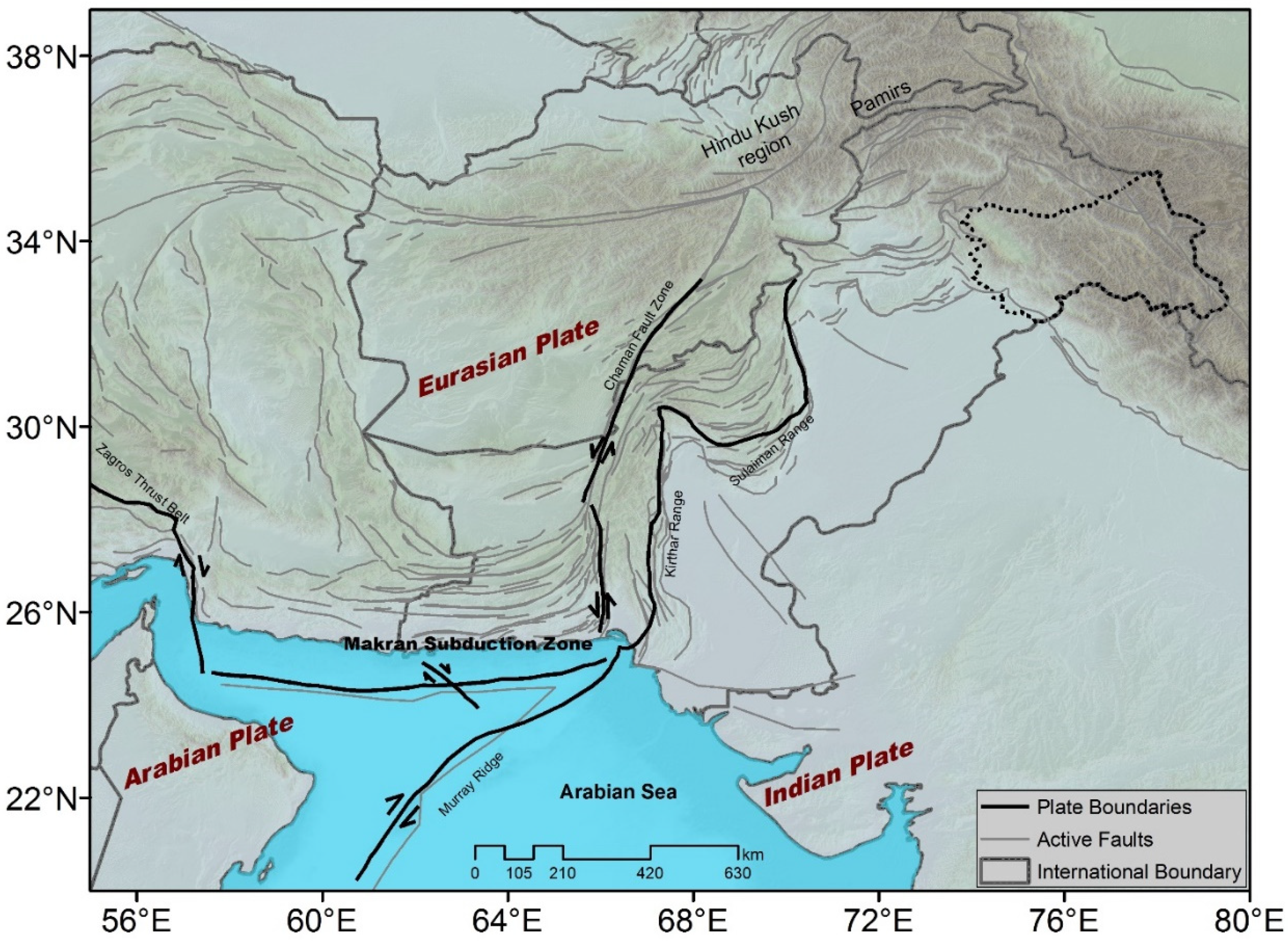
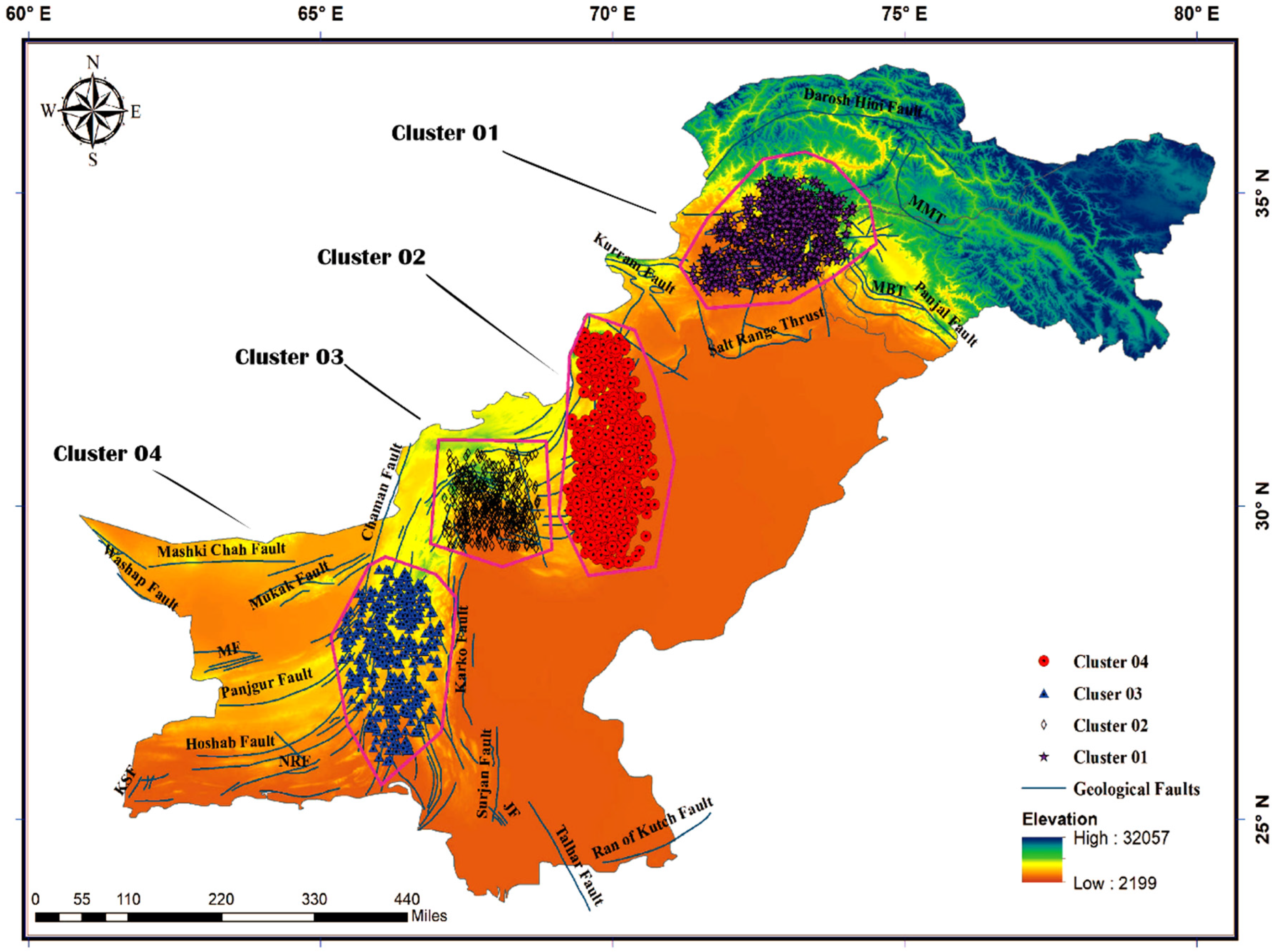
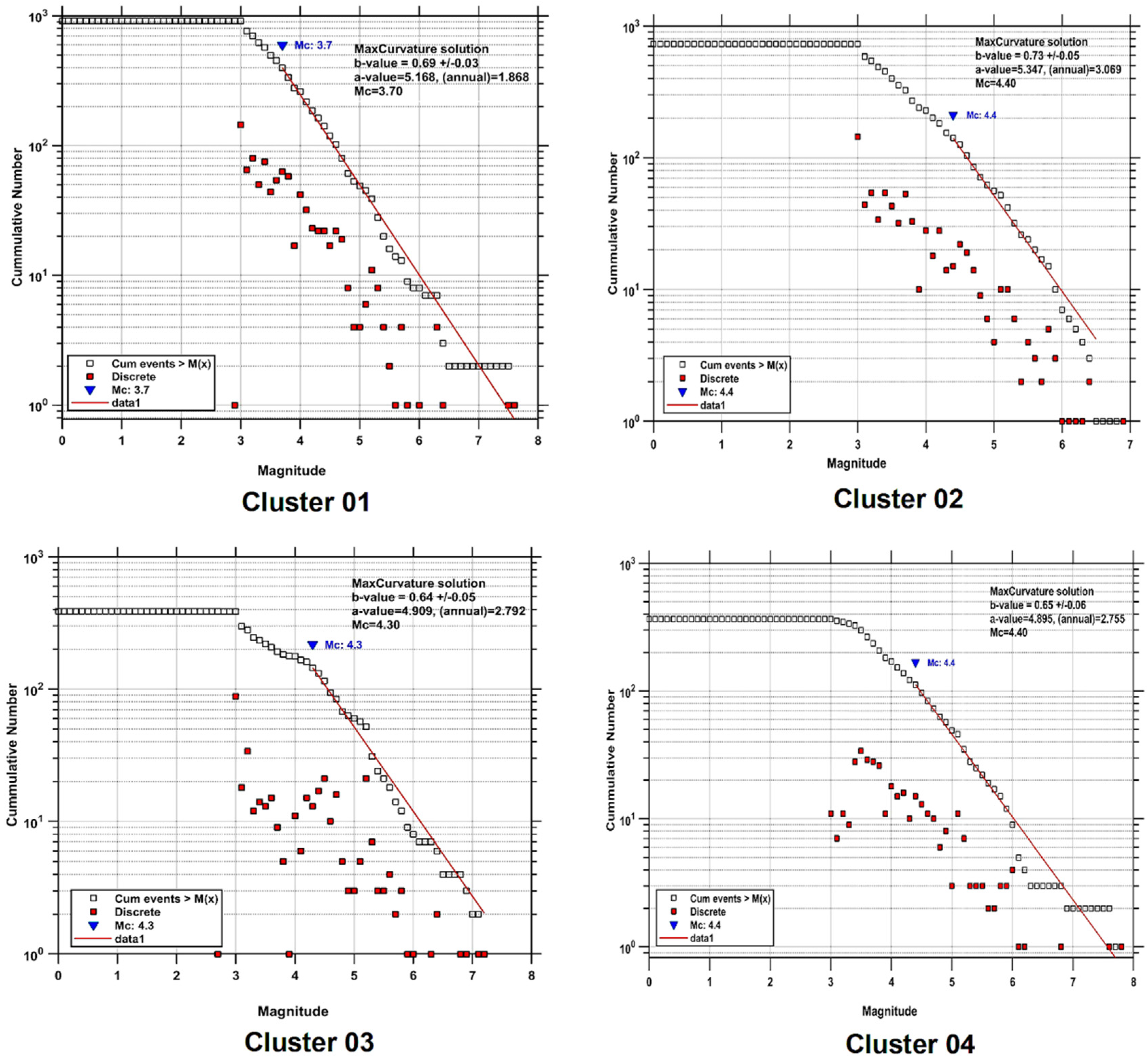
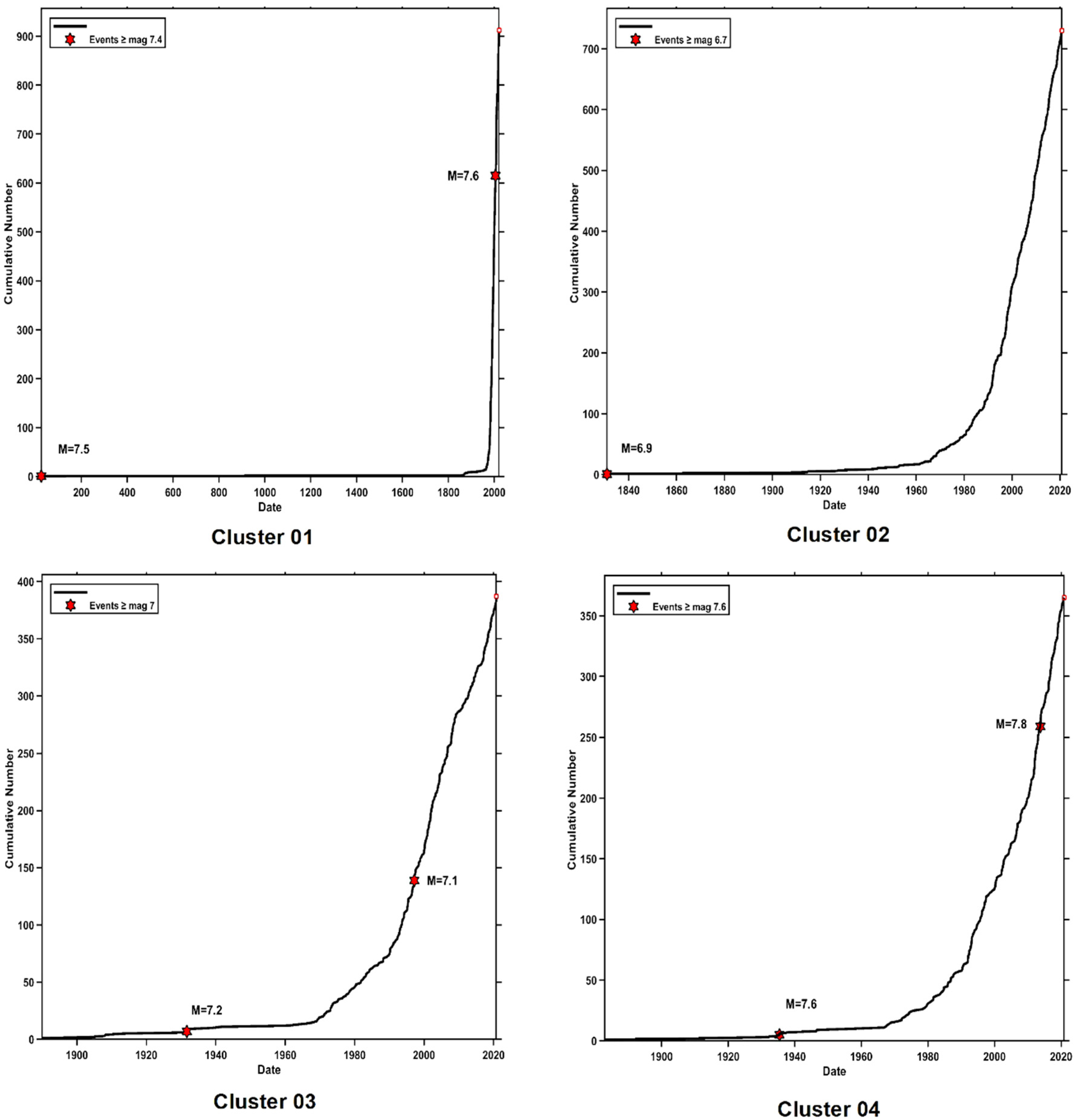
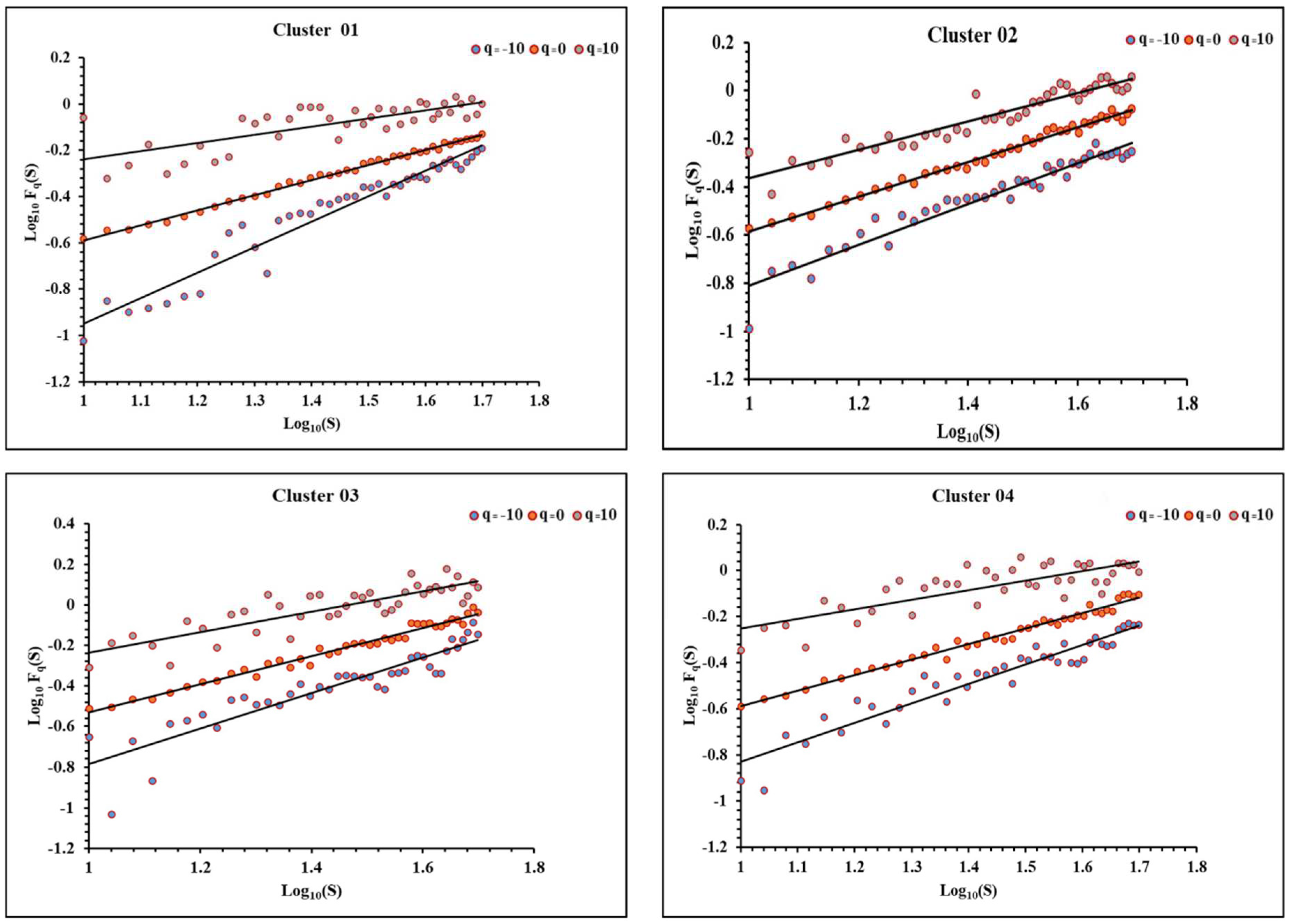

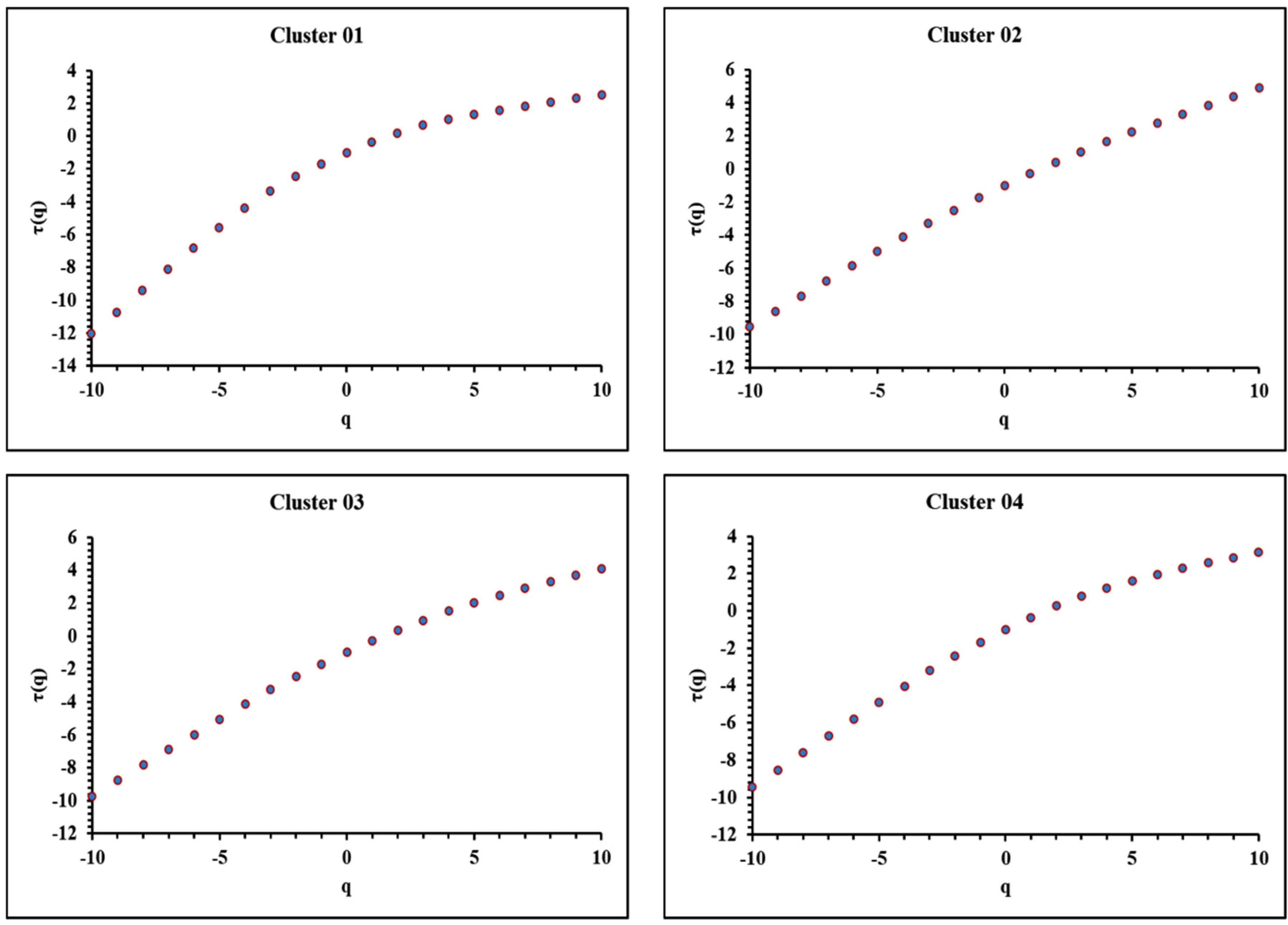
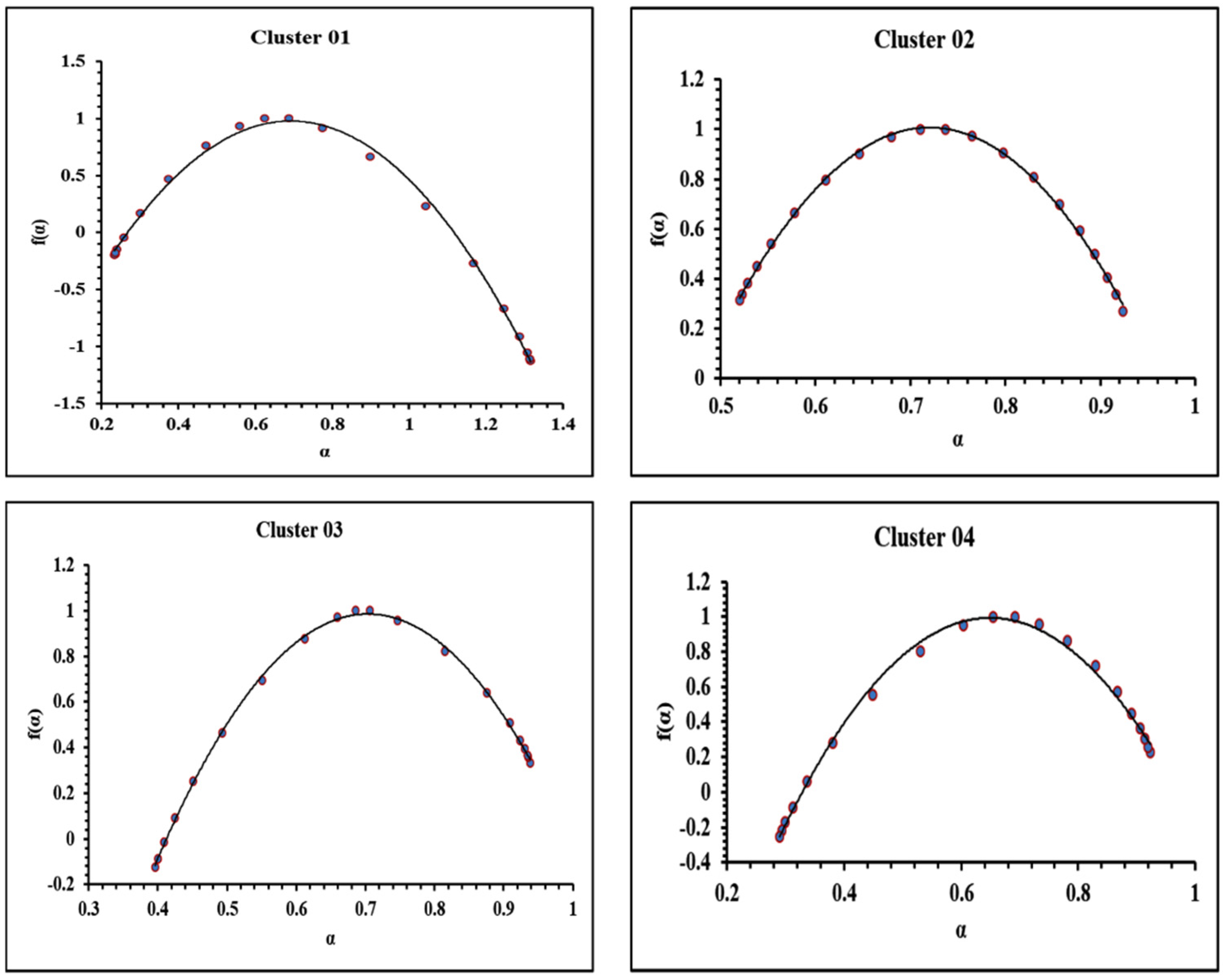
| Cluster No. | Period | Maximum Mw Range | Total Number of Events | standard deviation | Mc |
|---|---|---|---|---|---|
| 01 | 24 B.C-2020 | 2.9≤M≤7.6 | 912 | 0.69±0.05 | 3.7 |
| 02 | 1830-2020 | 3.0≤M≤6.9 | 730 | 0.73±0.05 | 4.4 |
| 03 | 1889-2020 | 2.7≤M≤7.2 | 387 | 0.64±0.05 | 4.3 |
| 04 | 1882-2020 | 3.0≤M≤7.8 | 365 | 0.65±0.06 | 4.4 |
Disclaimer/Publisher’s Note: The statements, opinions and data contained in all publications are solely those of the individual author(s) and contributor(s) and not of MDPI and/or the editor(s). MDPI and/or the editor(s) disclaim responsibility for any injury to people or property resulting from any ideas, methods, instructions or products referred to in the content. |
© 2023 by the authors. Licensee MDPI, Basel, Switzerland. This article is an open access article distributed under the terms and conditions of the Creative Commons Attribution (CC BY) license (http://creativecommons.org/licenses/by/4.0/).





